TM4E brings Java API to tokenize textual documents according to TextMate grammars with an Eclipse IDE client that can do syntax highlighting according to this tokenization; and Eclipse IDE client for VSCode Language Configuration to support matching bracket, auto close, on enter support.
TM4E is an official Eclipse.org project so it conforms to typical Eclipse.org requirements and guarantees.
You can install TM4E from the update site https://download.eclipse.org/tm4e/releases/latest/. TM4E is usually installed together with its consumers, so end-user should usually not need to directly install it.
The latest snapshot build can be installed from the update site https://download.eclipse.org/tm4e/snapshots/.
| TM4E version | Min. Eclipse version |
|---|---|
| latest | 2023-09 (4.29) |
| 0.9.0+ | 2023-09 (4.29) |
| 0.8.1+ | 2023-06 (4.28) |
| 0.8+ | 2023-03 (4.27) |
| 0.6.3+ | 2022-12 (4.26) |
| 0.6.2+ | 2022-09 (4.25) |
| 0.6.0+ | 2022-03 (4.23) |
Snapshot binaries of org.eclipse.tm4e.core are available at https://repo.eclipse.org/content/repositories/tm4e-snapshots/org/eclipse/org.eclipse.tm4e.core/.
You need to add the following repository configuration to your Maven settings.xml:
<?xml version="1.0" encoding="UTF-8" ?>
<settings>
<profiles>
<profile>
<repositories>
<repository>
<id>tm4e-snapshots</id>
<name>tm4e-snapshots</name>
<url>https://repo.eclipse.org/content/repositories/tm4e-snapshots/</url>
<releases><enabled>false</enabled></releases>
<snapshots><enabled>true</enabled></snapshots>
</repository>
</repositories>
</profile>
</profiles>
<activeProfiles>
<activeProfile>tm4e-snapshots</activeProfile>
</activeProfiles>
</settings>Then you can reference the dependency in your pom.xml like so:
<dependencies>
<dependency>
<groupId>org.eclipse</groupId>
<artifactId>org.eclipse.tm4e.core</artifactId>
<version>[VERSION]-SNAPSHOT</version>
</dependency>
</dependencies>[more information coming ...]
The following class and modules should be used as entry point provides:
- org.eclipse.tm4e.core provides the Java TextMate tokenizer. This project is a Java port of vscode-textmate written in TypeScript. This Java API can be used with any Java UI Toolkit (Swing, Eclipse, etc). See Core section for more information.
- org.eclipse.tm4e.ui provides the Eclipse org.eclipse.jface.text.presentation.IPresentationReconciler TMPresentationReconciler which is able to tokenize an editor content by using a given JSON, PList TextMate grammar and do syntax coloration. See UI section for more information.
- org.eclipse.tm4e.languageconfiguration provides the VSCode Language Configuration to support matching bracket, auto close, on enter support with a simple language-configuration.json.
An example with TypeScript:
Here are some projects that use tm4e:
- Apache NetBeans - A multi-language IDE written in Java that uses TM4E core parts to support syntax highlighting based on TextMate grammars.
- Eclipse IDE languages and frameworks integrations
- Eclipse Corrosion - Rust development tools in Eclipse IDE.
- Eclipse aCute - C# edition in Eclipse IDE.
- Eclipse Wild Web Developer - Simple and productive Web Development Tools in the Eclipse IDE.
- Eclipse ShellWax - A shell script development plugin for the Eclipse IDE, providing a rich edition experience through integration with the Bash Language Server.
- LiClipseText - An editor which enables Eclipse to be used as a general-purpose text editor, providing support for multiple languages out of the box.
- EditorConfig for Eclipse - EditorConfig for Eclipse with GenericEditor.
- Solargraph - Ruby development tools for Eclipse.
- dart4e - Dart/Flutter development support for the Eclipse IDE.
- haxe4e - Haxe programming language support for the Eclipse IDE.
- BEF: Bazel Eclipse Feature - Bazel support for the Eclipse IDE.
- Deprecated projects:
- Dartboard - Dart language support for the Eclipse IDE.
- typescript.java - TypeScript IDE for Eclipse with JSDT & tsserver.
- Phaser Editor 2D - an IDE for the creation of HTML5 games.
- License: TM4E is a community open-source project licensed under the Eclipse Public License 2.0.
- Support: You can ask (and answer!) questions in the GitHub discussions. Report bugs, and request features using GitHub issues.
- Source Code: This
github.com/eclipse/tm4erepository is the reference repository to contribute to TM4E - Build: Builds can be performed with a simple
mvn clean verify - Continuous testing, integration and deployment is performed by CI jobs at https://ci.eclipse.org/tm4e/ and https://github.com/eclipse/tm4e/actions
- Developers mailing-list: Contributors are also expected to subscribe the tm4e-dev mailing-list.
- Becoming a committer: as usual with Eclipse.org projects, anyone who's made significant contributions and who's upheld quality standards alongside good judgement and open-mindedness.



